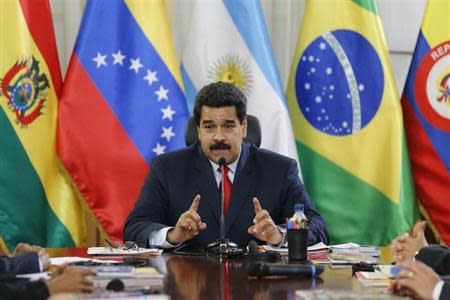Some airlines mull quitting Venezuela over debts: IATA

By Anthony Esposito SANTIAGO (Reuters) - Some major airlines are considering ceasing operations in Venezuela because of currency controls that have left the airlines unable to repatriate $3.8 billion in revenues, the head of the industry's main organization said on Wednesday. Members of the International Air Transport Association are frustrated with accumulation of local currency that they cannot transfer out of the country without incurring heavy losses, and disappointed with government silence about potential solutions. "I am aware that some of (the airlines) are considering very significant cutbacks or indeed suspending operations," said IATA Chief Executive Tony Tyler when asked in a Reuters interview on the sidelines of FIDAE airshow in Santiago. "The airlines want to keep serving the market. They want to keep connecting Venezuela to the world. But they do expect to get paid for it." Venezuela requires airlines to bill tickets sold to the country's residents in local bolivar currency, but the government currency board has not approved requests to repatriate the resulting revenue. Tyler said that within the past year, 11 airlines that have been flying to Venezuela have reduced their operations by between 15 percent and 78 percent. Air Canada suspended its operations this month, citing security concerns related to street protests, and Venezuela immediately cut ties to the airline. Individual airlines have held meetings with government officials, but without results, Tyler said. Major airlines flying to Venezuela include American Airlines , Lufthansa , Delta , Avianca and Copa . The IATA is keen on holding talks with government to seek a solution but has not been able to engage senior officials. Venezuelans now struggle to find flights out of the country, sometimes waking before dawn to find the few available fares. Travelers often say flights abroad are nearly empty. SALES SLOWDOWN "The simple fact is that many airlines have stopped substantial sales in Venezuela because they haven't been paid for the last year or so," Tyler said. "Very few airlines are still selling in Venezuela, which of course can't be good for the country. President Nicolas Maduro has promised to pay the debts back in full, but has also threatened to kick out any airlines that suspend service over the payment disputes. The currency control system, created in 2003 by late socialist leader Hugo Chavez, requires companies to seek approval from a state currency board to purchase hard currency. Local companies routinely buy dollars on the illegal black market, but foreign companies generally avoid doing so because of the potential for legal repercussions. Tyler said the airlines were sympathetic to creative solutions such as using government bonds or jet fuel to settle the debts but that no progress had been made. "In fact we had fuel experts visit the country, with a view to taking that idea forward," he said. "We had some preliminary discussions with trading companies who could help broker that kind of deal. But then the government has subsequently gone silent on both those options." Venezuela launched a new foreign exchange platform this week with a rate of around 52 bolivars per dollar, which could open a legal avenue for companies to send money back to headquarters. But using this system would create heavy losses for airlines that have been billing tickets at the official rate that was 4.3 bolivars per dollar in 2012 and 6.3 for most of 2013. The country's top economic official has said such losses are simply a part of the currency risks of international business and not the responsibility of Venezuela's central bank. Tyler said the airlines expect to be reimbursed at the official rate. "Sure you may have to take a foreign exchange risk, but what we're talking about here is out of all proportion to normal airline financial planning or financial provision," he said. (Writing by Brian Ellsworth; Editing by Andrew Cawthorne, Peter Galloway and David Gregorio)

